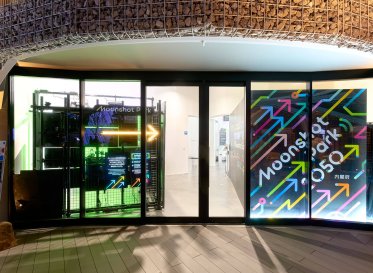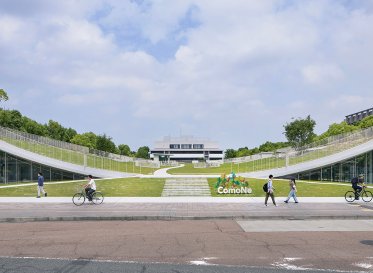
Strategic Visioning with the World Bank
Reflecting on Tokyo Development Learning Center’s past, present, and future
Background
Preparing for a new phase
In 2024, Loftwork facilitated a retrospective and visioning workshop for the Tokyo Development Learning Center (TDLC), a program of the World Bank founded in partnership with the Government of Japan. The workshop offered a space for the team to review the successes and challenges of Phase 4 (2020–2025), and to articulate TDLC’s direction for Phase 5 (2025–2030).

In the 20 years since its inception, TDLC has served as a knowledge hub for World Bank client countries, hosting knowledge exchange events and distributing research materials to share Japanese best practices in pressing topics such as solid waste management, climate adaptation, and urban infrastructure. TDLC’s most successful program is their Technical Deep Dive (TDD) series, in which delegates from World Bank client countries visit Japan to see successful case studies and discuss their respective challenges. TDDs are often — but not always — hosted by a member of the City Partnership Program, a cohort of seven Japanese cities that exemplify some aspect of TDLC’s target areas.

Loftwork and TDLC first collaborated in 2021, when FabCafe Kyoto was featured in the TDLC report Kyoto: A Creative City (Japanese only). With pandemic restrictions still in place, TDLC had pivoted its focus from in-person events to online events and publications. In the intervening years, in-person TDDs and other events have slowly returned, in line with a renewed vigor to tackle today’s most urgent issues through the dissemination of Japanese best practices.
Reviewing and revising TDLC’s collective vision
The pandemic spurred a rapid and dramatic change in TDLC’s activities, leaving the TDLC team feeling a need to align their perspectives before proceeding. To enter Phase 5 with a clear vision, they had to account for the best of Phase 4 and the challenges yet to come.

With over a dozen TDLC members participating in the workshop, there was no shortage of ideas, as well as local and global contexts for each project raised in discussion. By the end, these had to be written, refined, and aligned to create a unified internal and external vision backed by clear values and objectives. Moreover, because TDLC is a joint endeavor by the World Bank and the Government of Japan, this vision had to align with their priorities as well.
Output
The workshop: uncovering key insights for the way forward
The first step for the facilitation team was deep research. Reports on TDLC activities from Phase 4, as well as documents detailing the World Bank’s greater mission, were crucial to establishing a firm foundation for the workshop. While reviewing numerous case studies and reports, the facilitators crafted the curriculum for the two-day workshop, hosted in June 2024.
Over the course of the workshop, 14 TDLC participants — divided into three groups — discussed accomplishments, personally impactful moments, and overall impressions of Phase 4. Participants then distilled these observations into a core set of themes and focus areas. These core themes prompted in-depth conversations about TDLC’s direction for Phase 5, including potential reforms and innovations in their diverse offerings. Each participant composed a vision statement, which group members shared and refined into a well-defined, actionable concept.

The two-day workshop was thoroughly documented with audio and video recordings. Afterward, the team from Loftwork combed through these recordings to extract key findings and compile them into a report. This report will serve as a key reference document for TDLC and other World Bank teams when reflecting on the progress of Phase 4 and future outlook.
Key Point 1
The value of a creative approach
Reflecting on the challenges of the pandemic, TDLC knew they wanted a fresh, creative approach to this visioning exercise. The transition to virtual platforms for TDDs, and the gradual return to offline gatherings, have forced the team to find new ways to engage their international stakeholders. A creative framework for the workshop, they reasoned, would be well-suited to the situation.
The workshop curriculum used the Double Diamond Framework, an ideation process that alternates between divergent and convergent thinking. This framework ensures solutions are user-centered, well-researched, and thoroughly tested. By alternating between divergent and convergent thinking, it helps teams tackle complex problems methodically while encouraging creativity and innovation.

Ultimately, group vision statements emphasized the importance of activities such as the Water Secure Cities TDD in Fukuoka, a first-time collaboration between a CPP partner city, the World Bank Group, and the Quality Infrastructure Investment Partnership. Many people praised TDLC’s role in helping Fukuoka City officials showcase their specialized water management knowledge for an international audience of World Bank client country delegates.

Many participants also spoke highly of TDLC’s first regional TDD, held in 2024 in Cote d’Ivoire. By creating an opportunity to share Japanese best practices juxtaposed with successful local examples, this TDD was a prime example of the ways TDLC can continue to enrich its offerings and deepen its impact going forward.
Key Point 2
Open, equal conversations
Multiple participants had expressed interest in holding conversations that cut across various levels of the organization. The World Bank regularly distributes reports, roadmaps, and other information, but these are not always circulated widely within TDLC. In the workshop, members from various positions could share their perspectives, creating a chance for the whole team to get on the same page.

In addition to group ideation and final presentations, participants were encouraged to visit other groups and discuss their written ideas. These freeform exchanges gave rise to further insights, which in turn enriched the dialogue within each group.
Over the two days of the workshop, each person voiced their opinions, gave and received feedback from their colleagues, and reaffirmed their understanding of TDLC’s vision and mission as part of the World Bank. Participants walked away from this workshop with a holistic view of TDLC’s accomplishments in Phase 4 and a clear view of where they are headed in 2025 and beyond.
Project Outline
Project length: June 2024 –July 2024
- Participants: Haruka Miki-Imoto, Chris T. Pablo, Rhoel C. Bernardo, 11 TDLC staff members
- Project Manager: Kelsie Stewart, Tim Wong
- Creative Directors: Ming Chieh-Wu, Gina Goosby
- Photographer: Ryo Nakagomi
- Producer: Kelsie Stewart
What can we do for you?
Please reach out if you are interested in…
- Testing a creative approach in strategizing and planning for your business
- Leveraging English and Japanese resources to serve outbound clients
- Implementing design thinking strategies to enhance your company’s ability to respond to global challenges









